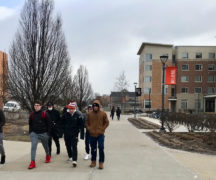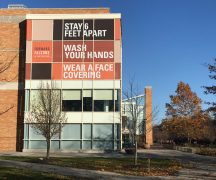Bowling Green State University (BGSU) promotes itself as “a public university for the public good,” and that its obligation to students goes beyond a degree. When I chose to enroll in BGSU, I believed that to be true. Now, as an alumnus of the University, I am hoping it’s still true.
BGSU offers students a top-notch education, resources, and campus life. In fact, the Wall Street Journal ranks it as the number one public university in the Midwest that students would choose again. However, for those of us who enrolled on campus for the Spring 2020 semester, we are left with a very different feeling. That’s because the national COVID-19 emergency unexpectedly forced students to abandon the in-person classes and on-campus resources we had expected, and for which we had paid over $5,000 in tuition and fees for just one semester. Because the administration had to move hastily and did not have time to carefully plan, the on-line courses were subpar in practically every aspect, from the lack of facilities, materials, and access to faculty. Sadly, it left students with a frustrating experience that was not equivalent in any way with in-person learning and campus life that students paid for.
For me, as an undergraduate student at BGSU studying to be a commercial pilot and pursuing a degree in Flight Technology and Operations, my education relies heavily on in-person instruction, peer collaboration, and field experience. None of these resources were available to me while the in-person classes were suspended.
I understand it is not the fault of the administration nor the state of Ohio that BGSU had to close campus operations and quickly switch to online classes. Nor do I believe it was their intention to not fulfill their contractual obligation to provide in-person college courses and access to facilities and services. That said, the college has made a flawed experience worse by rejecting students’ pleas for a fair refund.
The college, which has an endowment of over $150 million, could easily improve the lives of thousands by providing a commensurate refund on the tuition and fees students paid for in-person classes that semester. BGSU clearly distinguishes between in-person undergraduate classes and its eCampus, or online classes, in its enrollment documents and agreements. So, it’s a mystery – and fundamentally unfair and against their stated commitment to the public good – as to why they have thus far refused the refund.
In response, I am a lead plaintiff in a lawsuit on behalf of my classmates. It is our position that BGSU should be required to refund a portion of the tuition and fees that students paid, but did not receive, for in-person instruction during the Spring 2020 semester.
As a public university, BGSU is represented by Ohio Attorney General David Yost. Attorney General Yost has publicly advocated for common sense solutions in government and in higher education in particular. I am hopeful that this extends to ensuring students, who were negatively impacted by educational restrictions caused by COVID-19 pandemic, are not unjustly forced to carry the burden of having paid for academic experiences that we did not receive.
A public university should honor its obligations and commitments. BGSU’s words are currently ringing hollow, yet I remain hopeful that they and Attorney General Yost will engage with us in a good-faith dialogue on a just and equitable path forward. We deserve no less.
Lawrence Keba, Emmaus, Pennsylvania, is the lead plaintiff in Keba v. Bowling Green State University



